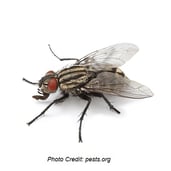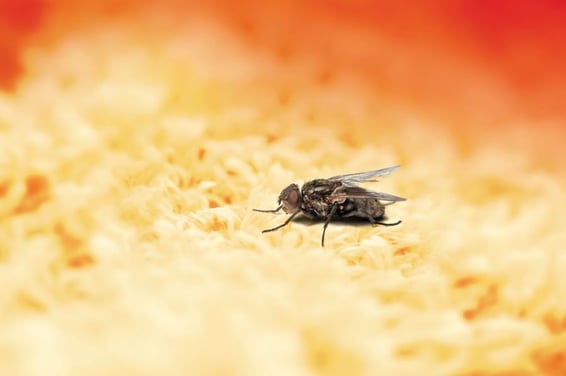Prevent Cluster Flies in NJ and PA with Cooper
 What is a cluster fly?
What is a cluster fly?
Cluster flies are very similar in appearance to house flies. They are about 0.31 - 0.39 inches long and gray, covered with visible yellow, bristle-like hairs. These slow flyers literally "cluster" together, sometimes in the thousands when they flock towards warmth. They fly into homes and commercial buildings between late August and early September when they are seeking a source of heat for the winter season. People usually notice cluster flies inside of buildings when they show up dead, in large quantities seemingly overnight. You can also find cluster flies clinging to the outside of buildings, typically on the third story and higher on the side of the building that gets the most direct sun.
Where do cluster flies come from?
Cluster flies have an interesting and bizarre life cycle. They begin their lives beneath the Earth in the soil, feeding on earthworms that live below as a parasite. Because they only lay eggs within the soil as opposed to within human food, cluster flies pose no harm to humans other than being a nuisance. Once they mature, cluster flies emerge from the ground and live outdoors until early fall. That's when you'll start to encounter these flying pests that are trying to escape the cold weather.
Why am I finding dead cluster flies in my office?
They “cluster” and enter buildings in very large numbers which makes them appear to show up all at once. Most people don’t even realize that they have a cluster fly infestation until they receive complaints from their tenants or employees that cluster flies are suddenly appearing or that they see thousands of dead flies everywhere. Cluster flies are only temporary visitors of buildings, using the structure solely for the purpose of seeking the warmth and protection from the cold winter temperatures. Come springtime, cluster flies will exit the building to live where outdoors. Once the spring arrives these temporary visitors will leave the building to once again resume their life cycle.
Do cluster flies bite?
Cluster flies do not bite and they are not attracted to filth or garbage. Because they don't get into food, there is no concern for the spread of disease and infection as a result of cluster fly activity. Their presence is an annoyance because of the way they 'cluster' together in large amounts. Some may have a higher tolerance to seasonal cluster fly activity, avoiding preventative measures all together.

Photo Credit: https://www.pctonline.com/article/meet-the-cluster-fly/
How do I get rid of cluster flies?
Once cluster flies are inside your building, it's not likely that you will be able to kill all of them or force them out completely. Cluster flies come indoors because they are looking for warmth to "overwinter" which is similar to hibernation. Other pests behave in this same way such as boxelder bugs, ladybugs, and stink bugs. The best way to avoid cluster flies or any other overwintering pest is proactive pest control. By treating your building before the cluster fly season begins, you will have the best chance at a reduction of activity. If you see dead cluster flies in your office, simply vacuum them up.
How can I prevent cluster flies in the future?
Keeping cluster flies out of a building by sealing visible cracks and crevices may reduce the numbers, but is rarely very effective given the difficulty associated with finding every tiny opening. You can take care of the previously mentioned issues yourself, but it may be challenging without the help of a professional who specializes in overwintering pest control. Paying attention to larger more visible issues such as tears in window screens or gaps around external doors can be an easy way to take steps towards cluster fly and general pest prevention.
How does Cooper prevent cluster flies in my commercial property?
Preventative treatments are always the most effective to keep out the cluster flies. This technique includes treating the exterior of the building including weep holes, windows, and doors to deter cluster flies from being attracted inside. Again, this service needs to take place in early fall before the weather becomes consistently cold.
However, if you currently have a cluster fly problem in your building, there are a few things that can be done to control the population. Cooper will send one of our highly trained technicians to your facility to install light traps and apply interior treatments. This may eliminate or severely reduce the cluster fly population, but there is no guarantee.
Not A Home Treatment
Cooper’s preventative cluster fly treatments are handled differently in a commercial facility setting versus a residential home. When preparing for a cluster fly treatment at a commercial property such as an office building or warehouse, different elements are considered to tailor a non-residential plan. The elements of commercial buildings are typically different than a residential home. The unique layout and features of your facility will guide a highly customized plan, not a one size fits all approach.
Free Consultation
Cooper Pest Solutions provides free, on-site consultations to property managers and building owners who are interested in professional cluster fly prevention. You will meet with a dedicated Commercial Sales Manager who will be your single point of contact for simple and personal customer service.
Call us at 1-800-949-2667 or fill out the form on our website for more information and to set up your free consultation.

